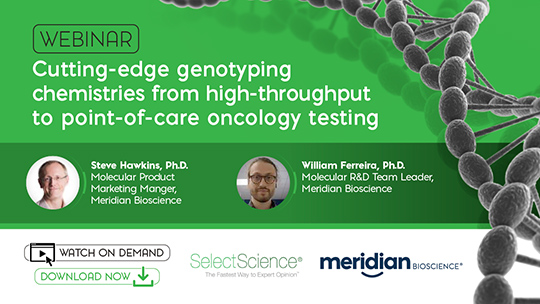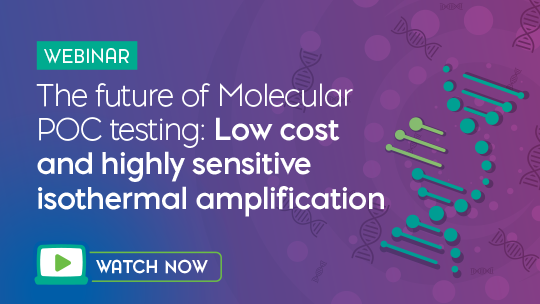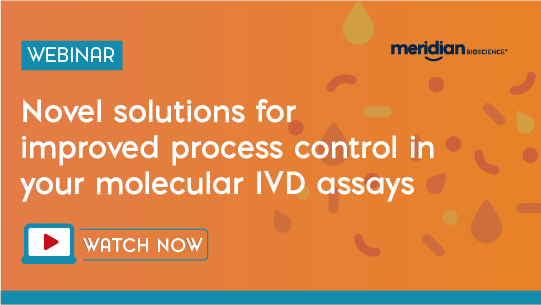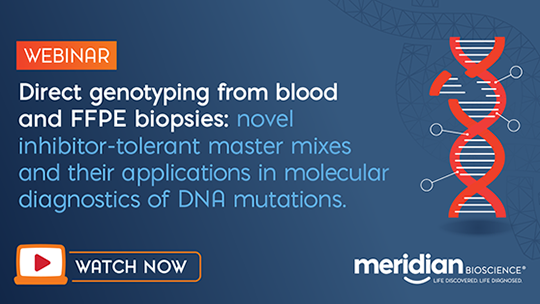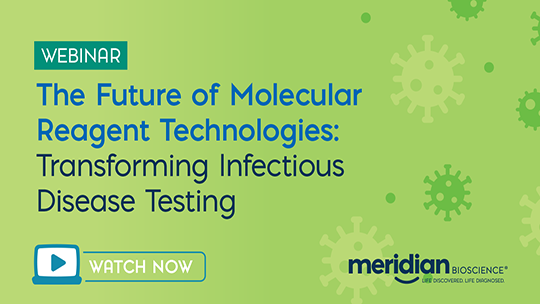Breaking Down Barriers: Revolutionizing Next Generation Sequencing Accessibility by Innovating Reagent Logistics
This webinar explores the groundbreaking impact of innovative next-generation sequencing (NGS) enzymes, library preparation kits and services on reshaping the sequencing landscape and accelerating the democratization of NGS in diagnostics. Learn about the newest eco-conscious and cost-effective solutions in NGS reagents, that eliminate cold-chain requirements and decrease NGS workflow-associated carbon footprint.
IN THIS WEBINAR, YOU WILL LEARN ABOUT:
- Logistical barriers to NGS democratization: Challenges due to shipping and storage of reagent kits under refrigeration conditions
- Technological advancements in NGS chemistries: Learn about the latest enzymatic solutions increasing the affordability and accessibility of NGS
- Meridian’s new glycerol-free enzymes: Discover how they enable lyophilization of the library preparation and amplification kits and eliminate the need for energy-intensive transportation and storage conditions
- The first-to-market lyophilized NGS library preparation kit: An introduction to the first commercially available kit of its kind
- High-concentration format: Understand the benefit of high-concentration enzymes that meet the demand for miniaturization, often required for point-of-care devices, and maximize sample input quantity to improve assay sensitivity.
Speakers:
Michele Amasio, Ph.D., Senior Manager, R&D – Molecular
Lina Gasiūnaitė, Ph.D., Team Leader, R&D – Molecular
The evolution of STI at-home testing solutions: Exploring key advancements in molecular and immunoassay testing for STI at-home kits
With the global increase of sexually transmitted infections (STIs), the need for accessible and accurate STI diagnostic solutions has never been more critical. Traditional testing methods are hindered by several barriers, including limited accessibility and STI-related stigma. This is further compounded by the challenge of asymptomatic infections, which deter initial testing. However, the unprecedented adoption of at-home testing and telemedicine that developed during the COVID-19 pandemic has facilitated the expansion of at-home and self-collection assays for several diseases, such as STIs. Join us as we delve into the changing landscape of STI testing, highlighting the new developments in at-home testing and the molecular and immunoassay reagent solutions for developing new STI assays.
IN THIS WEBINAR, YOU WILL LEARN ABOUT:
- What has changed in STI testing in the post-COVID market and the key differences between home-testing vs. self-collection assays
- Innovative molecular chemistries that enable sensitive direct detection using crude samples
- High-performing immuno-reagents ideal for rapid lateral flow tests
- The future direction of STI screening: trends and growth predictions
Speakers:
Steve Hawkins, Ph.D., Merdian Life Science Molecular Product Manager
Ryan Hughes, Ph.D, Merdian Life Science Immuno Product Manager
From Extraction to Result: Applying VLP Controls for Comprehensive Performance Validation Across Each Stage of an MDx Assay
As regulations tighten, find out how to improve process control through every step of a molecular assay, from samples to results!
DNA genotyping is a powerful technology that allows the identification of genetic variations that can lead to an increased risk of developing certain diseases. Additionally, genotyping has a fundamental role in companion diagnostics, as it enables the characterization of patients’ genetic profiles that can be used to guide treatment decisions.
Here, we will introduce two novel master mixes developed to provide PCR-based identification of mutations directly from the clinical samples, such as blood, plasma or FFPE tissue, bypassing DNA extraction and streamlining the analysis of both liquid and tissue biopsies.
Speakers:
Steve Hawkins, Ph.D., Product Marketing Manager
Top Reasons for Using Animal-Free HAMA/RF Immunoassay Interference Blockers
Avoiding immunoassay interference requires blockers to be included in every immunoassay. Historically, animal-based interference blockers have been used to improve assay accuracy; however, they are susceptible to cross-reactivity with assay reagents, lot-to-lot variability, and supply shortages – as seen during the COVID-19 pandemic. Meridian’s new animal-free commercial blockers, K-BlockTM and Mouse-FREE IgG, are the next-generation solution for blocking HAMA/RF/HA that overcomes the ethical concerns and supply problems in using animal-derived blockers.
In this webinar you will learn the advantages of using animal-free immunoassay blockers and their performance.
Speakers:
Ryan Hughes Ph.D, (Life Science Immunology Product Manager, Meridian Bioscience)
Tatiana Chirkova, Ph.D, (Upstream Process Development Scientist, Meridian Bioscience)
Looking to detect SNPs or other point mutations in samples that have a limited number of DNA copies?
Join our in-house experts William Ferreira, Ph.D. and Steve Hawkins, Ph.D., for their latest webinar where they share their insights on the newest range of Lyo-Ready Genotyping Direct qPCR Master mixes that support commercial assays designed to detect mutations.
In this presentation, you will learn how to detect single nucleotide polymorphisms (SNPs) directly from blood, plasma, urine, stool or FFPE tissue (down to 1 copy/reaction) using a simplified workflow that eliminates the need for nucleic acid extraction.
Speakers:
William Ferreira, Ph.D., R&D Team Leader
Steve Hawkins, Ph.D., Product Marketing Manager
The Future of Molecular POC Testing: Low Cost and Highly-Sensitive Isothermal Amplification
The recent pandemic and increasing frequency of infectious disease outbreaks due to climate change, urbanization, and increased human migration have drawn significant attention to nucleic acid amplification-based diagnostic technologies (NAAT). Currently, these technologies are mainly accessible only to trained workers in centralized facilities. There is a growing demand for home-based, extraction-free testing using crude samples, however, there are significant challenges in assay development for these point-of-care (POC) applications.
In this upcoming webinar, you will learn:
- Advances in isothermal amplification as an alternative to the current qPCR gold standard
- Advantages of loop-mediated isothermal amplification (LAMP) and nucleic acid sequence-based amplification (NASBA) for the development of the next generation of sensitive, affordable, mobile POC devices
Speakers:
William Ferreira, Ph.D., R&D Team Leader
Steve Hawkins, Ph.D., Product Marketing Manager
Novel Solutions for Improved Process Control in Your Molecular IVD Assays
As the IVD industry continues to evolve, new regulations frequently come into place to better control an innovative and growing industry. Molecular IVDs in particular are experiencing tighter regulations regarding the presence of appropriate controls within the assay. All tests must include both positive and negative controls which are subjected to the whole testing process, including the extraction step. Novel co-extracted exogenous controls are providing cutting edge solutions for monitoring RNA or DNA analysis including the detection of potential inhibition. These controls can be used across a variety of sample types and assays, representing a significant advantage over traditional spike-in controls.
Speakers:
Michele Amasio, Ph.D. (Research and Development Senior Manager, Meridian Bioscience)
Moderator:
Steve Hawkins, PhD (Product Marketing Manager, Meridian Bioscience)
Direct Genotyping from Blood & FFPE Biopsies: Novel Inhibitor-Tolerant Master Mixes & Their Applications in Molecular Diagnosis
DNA genotyping is a powerful technology that allows the identification of genetic variations that can lead to an increased risk of developing certain diseases. Additionally, genotyping has a fundamental role in companion diagnostics, as it enables the characterization of patients’ genetic profiles that can be used to guide treatment decisions.
Here, we will introduce two novel master mixes developed to provide PCR-based identification of mutations directly from the clinical samples, such as blood, plasma or FFPE tissue, bypassing DNA extraction and streamlining the analysis of both liquid and tissue biopsies.
Speakers:
Mihai-Nicolae Podaru, PhD (R&D Senior Scientist, Meridian Bioscience)
Moderator:
Steve Hawkins, PhD (Product Marketing Manager, Meridian Bioscience)
Transforming Cancer Detection with Liquid Biopsy
Liquid biopsy is fast becoming the method of choice for cancer diagnosis in the field of precision medicine, allowing oncologists to choose a targeted therapy, monitor treatment resistance and detect minimal residual disease, without patients undergoing an invasive procedure. Liquid biopsy utilizes bodily fluids such as blood, stool, urine and saliva to detect cancer biomarkers earlier than conventional methods such as tissue biopsy. It is also useful to screen for drug-resistant subpopulations, micro-metastases, minimum residual disease and disease relapse. The non-invasive approach of liquid biopsies enables samples to be taken easily and repeatedly over the course of a patient’s treatment, overcoming the inherent shortcomings and risks of surgical tissue biopsies. This panel discussion will review how liquid biopsy is opening up new avenues in cancer detection and continuous monitoring for personalized cancer treatment, as well as the screening of cancer markers for therapeutic resistance. Four industrial leaders in the field of molecular diagnostics will come together to discuss the current status of liquid biopsy for cancer screening, as well as how modern technologies are changing the landscape of cancer detection and CDx.
Panelists:
Chris Sale (CEO, Nonacus, UK)
Shidong Jia, PhD (CEO, Predicine, USA)
Hongjun (Harry) Yang, PhD (Senior VP of CDx, DiaCarta, USA)
Florent Chang-Pi-Hin PhD (VP of R&D, Meridian Bioscience, USA)
Moderator:
Steve Hawkins, PhD (Product Marketing Manager, Meridian Bioscience)
The Future of Molecular Reagent Technologies: Transforming Infectious Disease Testing
The molecular diagnostic approach for infectious disease such as STDs, tropical, and respiratory disease has seen significant development in the past twelve months, driven by a demand for better, faster, higher sensitivity assays, that can detect asymptomatic carriers. Traditionally, lab-based tests using blood samples have been the mainstay for molecular testing, however home-based, extraction-free tests, using alternative sample types (saliva, urine, stool) are now highly sought after, but pose significant challenges in assay development for both lab-based and point of care (POC) applications.
In this webinar you will learn about:
- New nucleic acid amplification chemistries that simplify direct detection
- Optimizing assay performance per sample types (e.g. blood, saliva, urine, stool)
- The latest technologies that can reduce your cold-chain management
Presenters
Michele Amasio, Ph.D.
Research and Development Senior Manager
Steve Hawkins
Ph.D. – Product Marketing Manager




